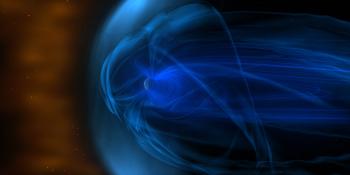Viewing archive of Monday, 28 October 2002
Solar activity report
Any mentioned solar flare in this report has a scaling factor applied by the Space Weather Prediction Center (SWPC). Because of the SWPC scaling factor, solar flares are reported as 42% smaller than for the science quality data. The scaling factor has been removed from our archived solar flare data to reflect the true physical units.
Report of Solar-Geophysical Activity 2002 Oct 28 2200 UTCPrepared by the NOAA © SWPC and processed by SpaceWeatherLive.com
Joint USAF/NOAA Report of Solar and Geophysical Activity
SDF Number 301 Issued at 2200Z on 28 Oct 2002IA. Analysis of Solar Active Regions and Activity from 27-2100Z to 28-2100Z Solar activity has been moderate due to an M1/1n flare
at 1205 UTC from Region 162 (N25W59). Region 162 continues to show
flux emergence and consolidation in the western portion of the
trailer spots where the group has a delta configuration. Additional
frequent C-class subflares were produced by this region throughout
the day. New Region 173 (S17W69) emerged on the disk today and new
Region 172 (S17E44) was assigned. An erupting prominence was
observed near the northeast limb beginning around 2200 UTC and was
associated with a narrow CME in LASCO as well as a type II sweep
with shock velocity of 1015 km/s. The event was promptly followed by
a back-sided full halo CME which was first observed in LASCO at 2326
UTC.
IB. Solar Activity Forecast
Solar activity is expected to be
moderate because of Region 162. There continues to be a slight
chance for major flare activity from this region as well. The
current observations of strong activity behind the east limb suggest
that there is likely to be a gradual increase in background levels
and activity levels over the next three days.
IIA. Geophysical Activity Summary 27-2100Z to 28-2100Z
The geomagnetic field was unsettled to active. Solar wind signatures
continue to indicate the presence of a high speed solar wind stream
associated with a coronal hole. The greater than 2 MeV electron
fluxes reached high levels today.
IIB. Geophysical Activity Forecast
The geomagnetic field is
expected to be mostly unsettled for the next three days as the
currently enhanced conditions are expected to subside.
III. Event Probabilities 29 Oct to 31 Oct
| Class M | 60% | 60% | 60% |
| Class X | 10% | 10% | 10% |
| Proton | 10% | 10% | 10% |
| PCAF | green | ||
IV. Penticton 10.7 cm Flux
Observed 28 Oct 158 Predicted 29 Oct-31 Oct 155/155/160 90 Day Mean 28 Oct 176
V. Geomagnetic A Indices
Observed Afr/Ap 27 Oct 013/022 Estimated Afr/Ap 28 Oct 014/016 Predicted Afr/Ap 29 Oct-31 Oct 012/012-012/012-010/012
VI. Geomagnetic Activity Probabilities 29 Oct to 31 Oct
| A. Middle Latitudes | |||
|---|---|---|---|
| Active | 30% | 30% | 25% |
| Minor storm | 20% | 20% | 15% |
| Major-severe storm | 10% | 10% | 05% |
| B. High Latitudes | |||
|---|---|---|---|
| Active | 35% | 35% | 30% |
| Minor storm | 25% | 25% | 20% |
| Major-severe storm | 10% | 10% | 05% |
All times in UTC
Latest news
Latest forum messages
AR 4065 13Ask your obscure/"stupid" space weather questions. 376AR4064 29Filaments and prominences 106AR 4055 115
More topicsSupport SpaceWeatherLive.com!
A lot of people come to SpaceWeatherLive to follow the Sun's activity or if there is aurora to be seen, but with more traffic comes higher server costs. Consider a donation if you enjoy SpaceWeatherLive so we can keep the website online!

Space weather facts
| Last X-flare | 2025/03/28 | X1.1 |
| Last M-flare | 2025/04/22 | M1.3 |
| Last geomagnetic storm | 2025/04/21 | Kp5+ (G1) |
| Spotless days | |
|---|---|
| Last spotless day | 2022/06/08 |
| Monthly mean Sunspot Number | |
|---|---|
| March 2025 | 134.2 -20.4 |
| April 2025 | 121.5 -12.7 |
| Last 30 days | 116.5 -16.8 |


